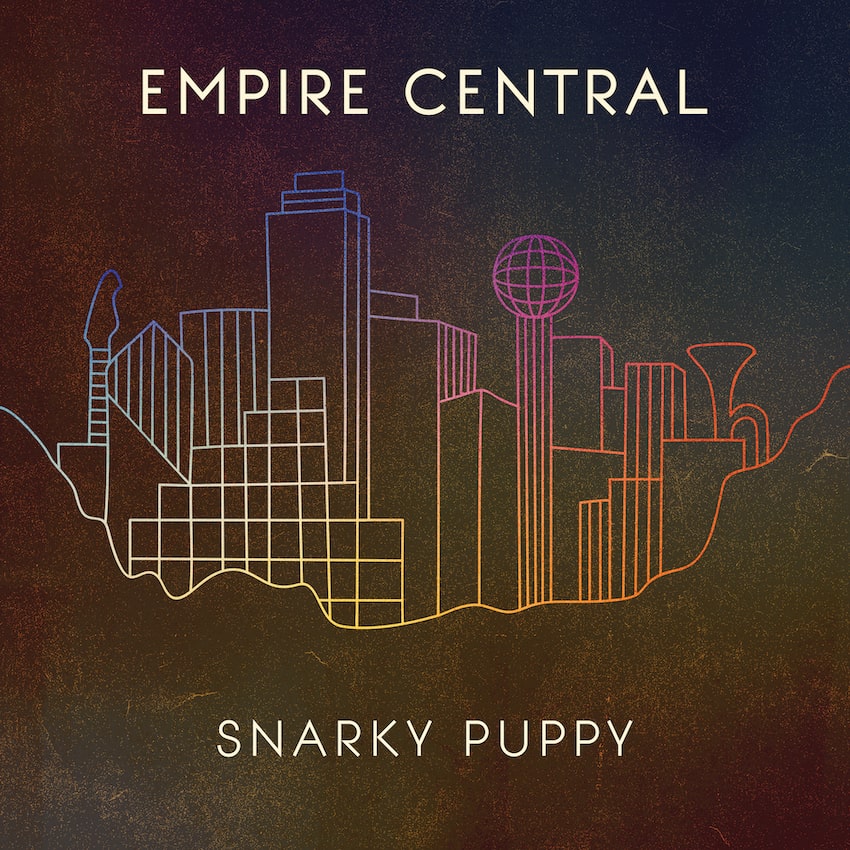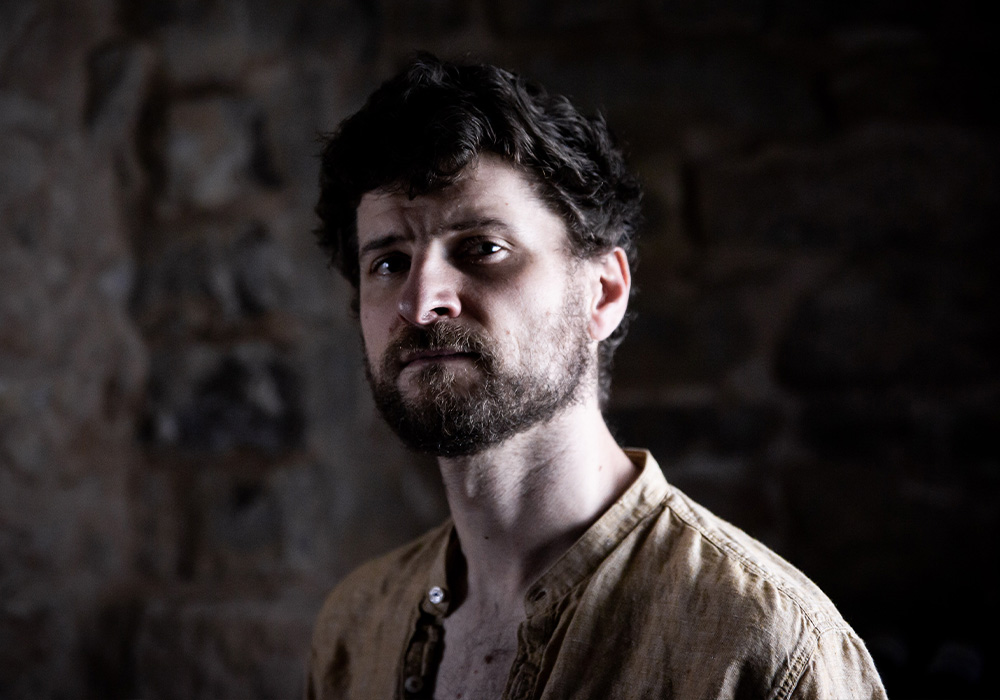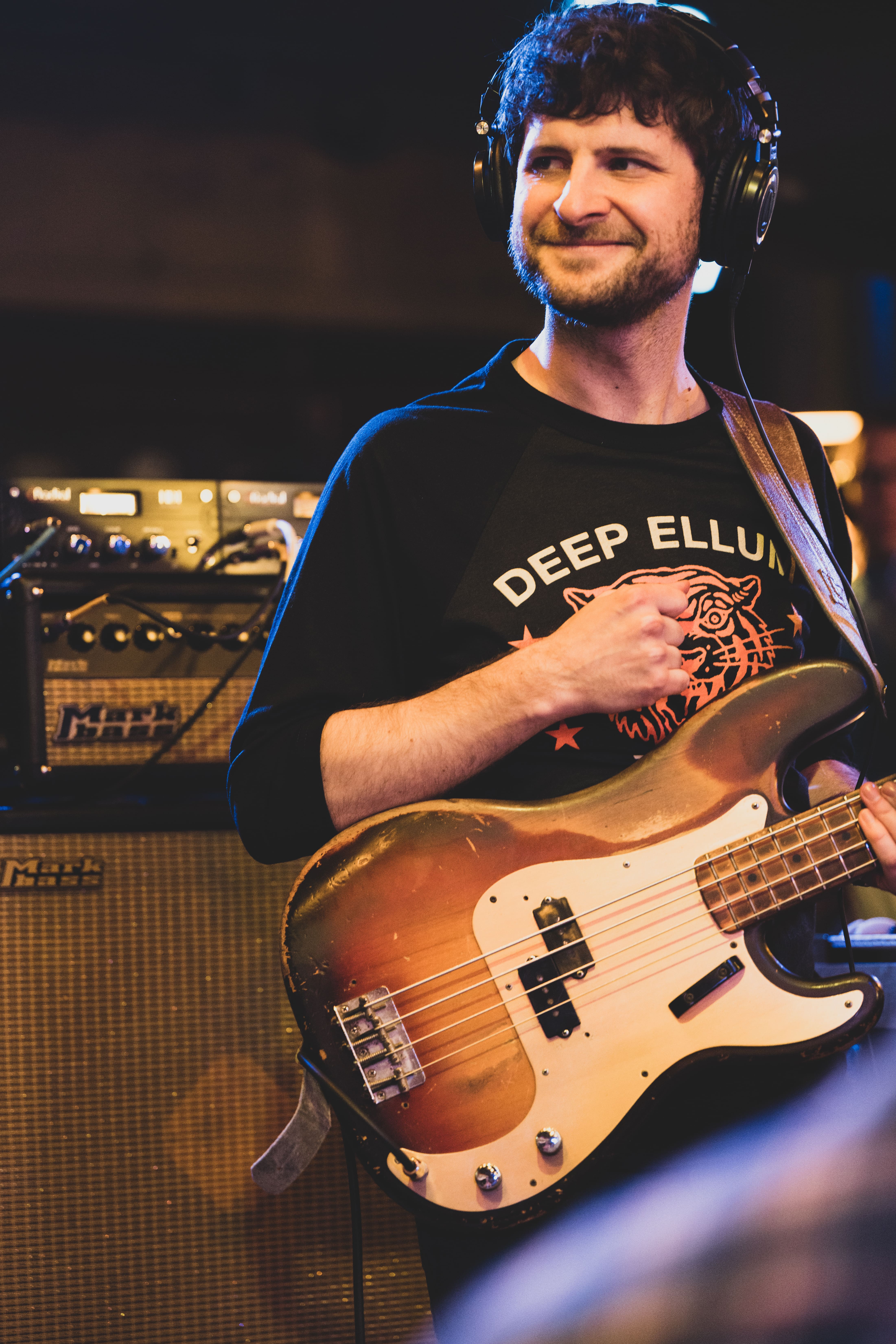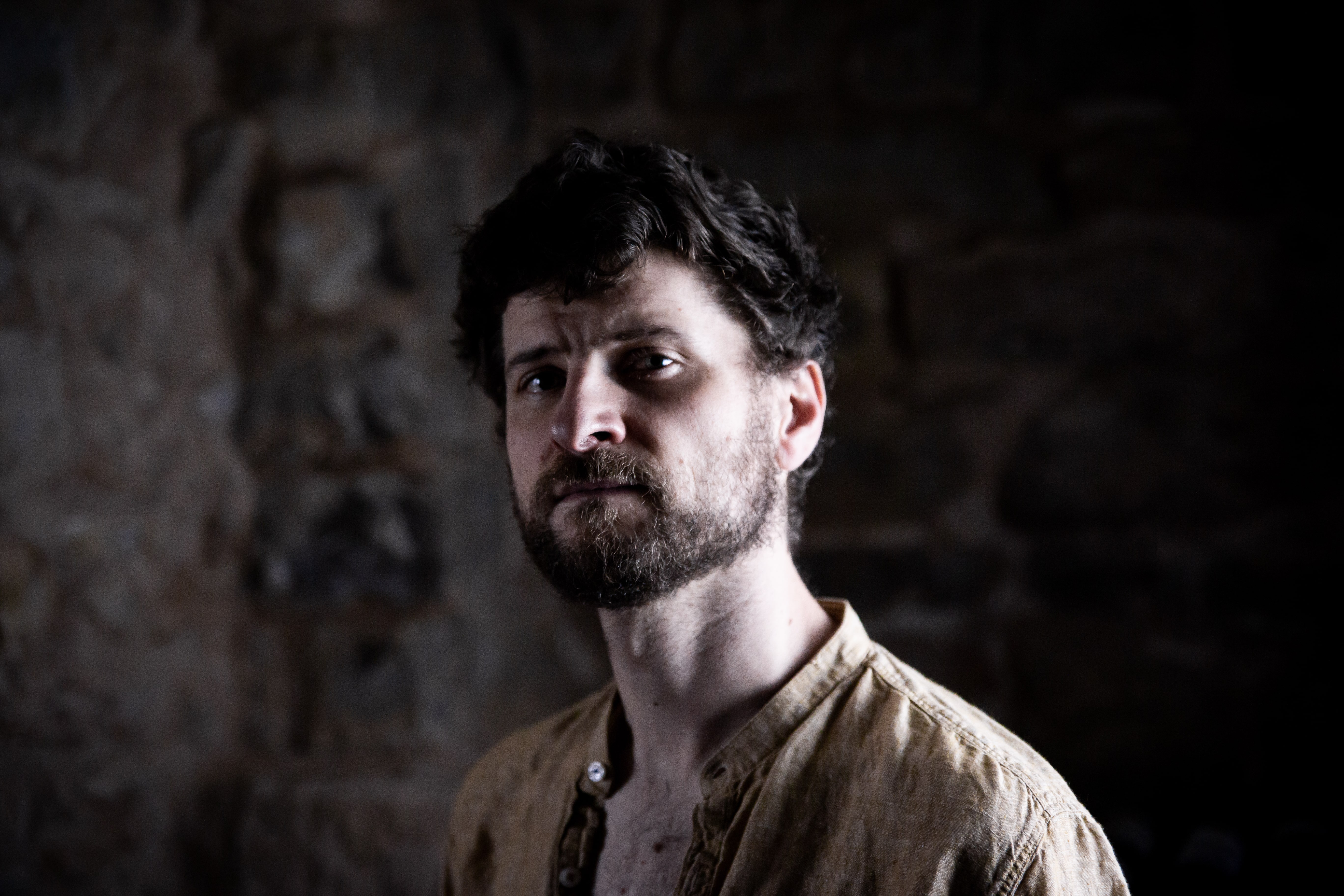Congrats on Empire Central. I finally watched a couple of music videos from the performances and recordings. I didn't even know it was that many people playing music together.
It's a lot, yeah.
You're lucky, because there's only one bass guitar, right?
Well, there's one electric bass, but at any moment one out of five people could be playing bass. There are key-bass players and baritone guitars. You never know where the sound is coming from!
How many musicians did you have playing on that?
There were 19, or 20 with Bernard Wright sitting in.
I know you've done a number of albums with an in-studio audience. Has that been a conscious thing to keep the performance aspect of the music happening?
Yeah. The heart of it is that the band is a live band. That's always been where the energy and magic has occurred, when we've been playing in front of people. We were doing the normal thing, going into the studio and making records. We did this for three albums; the first six years of the band was like that. At a certain point there was this thing of, "How can we represent the live experience in an album in a way that isn't a 'Live at…' record?" There's the whole thing of dealing with the sound of this massive PA. How do we mix it so that it sounds beautiful? It seemed the best of both worlds would be to make a studio album live and bring the audience into the studio rather than bringing the studio to the audience, which is what most live albums are. That's how we came up with this concept. I guess we first did it in 2009 with Tell Your Friends. We stuck with it and tried to make it better every time. We did it on Ground Up, We Like It Here, Sylva, and two Family Dinner records. At a certain point, we got to feeling like we couldn't do this every time. I believe strongly that when you change the process, you change the product. I also don't like this idea of finding something that works and doing it over and over again. It starts to feel more like McDonalds than David Bowie. I thought it would be good to change up the process. So, we did two studio records, but we did each one of those in a different way that was unconventional. Then we did Live at the Royal Albert Hall, which was a more traditional live record.
Right.
After six years of not using this format, we went back to it with Empire Central. It's coming back into our comfort zone, in a certain way. Then, of course, we did many things with this record that we've never done with any of these live in studio records. Every time it has to be different. That's what we try to do, even when we play live.

What were the main differences in the process for Empire Central?
Empire Central is like the live version of our last studio record, Immigrance, in a certain way. The idea behind Immigrance was that we were going to have everyone in the band playing live, but we'd never have more than one drummer playing at a time. On [the previous album], Culcha Vulcha, we had two drummers playing in unison at any given moment. On Immigrance, we had one drummer playing the verses, one drummer playing the choruses, and one drummer playing the solo section. That's what we did live on Empire Central. The drummers are switching on the downbeat of every section.
Holy shit.
Yeah. If we're making a studio album, there's the luxury of changing snares for the chorus, or changing bass drums, depending on what we want for each section. Of course, when we play live with a single drummer, we don't have that luxury. Rather than it being this super frivolous idea of, "Let's have everybody on every track," because we can, the idea is, "How do we use this to our advantage in a way that a producer would use it if they were making a studio record?"
Watching the videos, I didn't see sheet music. How were the arrangements done of who comes in on which sections, or who takes the lead?
We do it in rehearsal. There's no sheet music. Everybody learns everything by ear. The idea is that everybody learns the whole song. If we need to make changes, we can do it without someone having to say, "Give me ten minutes so I can learn this." We never have two people playing a Fender Rhodes sound at a time. It's always one person playing organ, one person playing Rhodes, one person playing a synth, and another person playing a melody. The truth is that sometimes we see these comments online about, "I don't understand why they're doing with 20 people what they could do with eight." The idea is that when you make a studio record, you layer. We're just doing the layering live. At any given moment, sometimes there are only four or five people playing. If you watch the footage, of course you're not going to see a lot of shots where people aren't playing, because we don't choose the shots where someone is standing there looking at another person playing! [laughs] The idea is that we use the musicians and instrumentation at our disposal in the ideal way. We don't do it to make everybody feel good, where everybody plays all the time. Also, we don't ignore people. We treat it as if we were doing a recording session, like, "How many keyboards would we have in this section? Okay, let's do that." That's the idea.
How did you choose to work at Deep Ellum Art Company [in Dallas, Texas]? That space looks awesome.
We recorded at an old electric factory in Holland for Sylva, in a church for Family Dinner 2, and in a theater for Family Dinner 1. We asked ourselves, "Who has a space that we can work in that is cool?" It's more about the people and their commitment to helping us realize the vision than it is about the space. They can have a beautiful space, and if the people who own it are uptight then we can't realize the vision. The Deep Ellum Art Company people were totally on the same team with us. They did anything that we needed to make it possible. It's an unconventional situation, and it requires unconventional requests. It was amazing.
Nic Hard was the engineer on this?
Yeah. Nic and I have probably done 40 records together, at least.
I'll ask him more questions about this, but that must have been a lot of inputs?
[laughs] I think it wasn't actually that crazy. We were somewhere between 90 and 120 tracks. Nic and I did a record [What Heat] with my other band, Bokanté, with Metropole Orkest, and we had 240 tracks. It was crazy on every song. It wasn't small, but it was manageable!
Did you mute parts that had been recorded live to help with the arrangement?
It happened more when we first started doing these records. Now, I think the band is a lot smarter about playing. We know when to play and not to play. We know when something will be useful. That's what I was trying to say about how helpful it was to have done two studio records in between the last live studio record and this record. Everybody in the band individually has grown as studio musicians. Now we're much more mature. We're older. We understand what works on a record and what doesn't work. In rare instances, I've muted parts. The idea is, obviously, that we never add anything. There are no overdubs. We only hear what was there, or less. I might have muted a certain keyboard double on a melody or a chord pad if I didn't feel it was working, but very rarely.
You did a number of nights, right?
Eight, yeah.
Were they the same set of the same songs?
No. There were 16 songs. We only had time for about six per set. We did 16 sets. I would do a different set list for every set. Each song over the course of eight nights got played probably eight to ten times.
That's still a lot to sort through. How was this process initiated and completed?
Just me with headphones and a Dropbox folder taking notes. I listened to every take. I did the math, and it was 56 hours of listening to get through each take one time. It was a lot. But I can eliminate takes quickly, and then listen to the two or three strongest takes several times each. It's an ecosystem. I don't just go with the take that I like best for each song. I think about how it all fits together as a record. "Do we have soloists?" Every take and track can't feel epic. Some just need to feel good. It's producer work. Nothing new, I think.
Well, I want people to see that it does require a concerted effort and work to go through a process like this. I tell everybody that in making a record, the work has to be done somewhere. Either it happens before you get in the studio, or it happens after everything's been tracked, or it happens in the middle.
In this case I would say that everybody in the band and crew did an extraordinary amount of work. Then, afterwards, there's me sifting through the takes and picking them. Then, after that, there's me editing, and then Nic doing the initial mixes. Then me and Nic were going through and doing the mix revisions, the changes. There are a lot of steps to the process, especially a record that has 16 songs and eight to ten takes of each song. We did it all with no break. I was choosing takes the day after the recording finished, because we had a deadline. Also, we had to edit video, which takes a significant amount of time. I had to spend four days at the director's house. I did the initial video edits, and then he would come in and make them look sexier. Like you said, the work has to get done somewhere, and it gets done in a lot of different places as well.
Was it good to jump right into it and keep the process going instead of taking a break?
Yeah. To be perfectly honest, I absolutely hate working on multiple projects at the same time, and I hate taking breaks. I get in the world of a project and then slowly leave that world. To suddenly get thrown back into it? I don't feel like I do my best work in that way. Sometimes breaks are very good, in order to get perspective. But sometimes I can lose the whole excitement, energy, and magic. At the end of the day, a record isn't this permanent representation of a group or a musical concept. It's a snapshot, but it lasts forever. In that way it's permanent. But it's not reflective of the entire group's lifespan. The best is to put a lot of energy into a specific moment in time and then move on.

With Snarky Puppy, these snapshots of different lineups need to be captured, and they're going to be indicative of different eras.
Yeah. I think that's a good thing. It's a human thing to assign more value and attention (and worry and stress and preciousness) to things that are scarce. If I was going to make one record in my life with Snarky Puppy, I would stress about it, be anxious, and hope that it's perfect. But this is our 14th record. At a certain moment, you stop worrying and start saying, "Let's do the thing, make it as good as we possibly can, have it represent us in this moment, as best as we can, and then move on and do the next thing." Let people love it and let people hate it. Just keep cooking. If you wait too long, you'll forget what you're representing. It's good to do things quickly. Spend as much time as you need to get them right, but then to not be overly precious about them. I'm glad that Tape Op is doing something on this record. You have a readership that is interested in the engineering and the technical side of the record. I can't say enough good things about Nic. He's taught me quite a bit about how to make big decisions quickly and make big moves. Live with it for a minute and see if I love it or see if I hate it.
How long have you worked with Nic now?
The first record I did with him was a record [Forq] for a band that I used to have called Forq, which still exists but I don't play in anymore. It's been about ten years. This is the first live studio record that he's done for Snarky Puppy. He did the two studio records, and then the Live at the Royal Albert Hall record. He did an unbelievable job.
Yeah. The sound quality is over the top, as is the Bokanté + Metropole Orkest album [What Heat].
Nic is conscientious and obsessive, as most good engineers are, but I also love his approach to perspective. He's good about taking breaks, cleaning his ears, and not having too many preconceptions. He's one of the least stubborn people I know. He's open to making big, drastic changes and decisions. When you're that way, you open up your potential to arrive at places that you never thought you would.

You just described a great musician.
Yeah! Exactly. That's why musicians love him so much. He's not going to say, "I know how to get great sounds. I always do it this way. This is how we're going to do it." He's always asking, "What is the weirdest idea that we can use here?" I love that about him.
You've also produced a handful of records for people like David Crosby and Susana Baca. How do you see your role when you take on these sessions?
Well, the role that I have as a producer changes, depending on the artist and the album. Sometimes producing a record is 99 percent psychology and 1 percent musical. Sometimes it can be as little as 98 percent psychology. But I don't think it's ever less than 98 percent!
Yeah, right?
I have to figure out how to get the best performances out of every single musician involved, and out of the engineers, in such a way that the artist feels their vision is being realized. With Susana, I behave very differently than I do with David. I use tactics that I don't use if I record with a much, much younger artist. I have to be flexible and malleable. That's what production is: "How do I bring out the best in everybody in order to achieve a musical end that makes the artist happy?" In certain situations, I'm micromanaging everything. I'm turning EQ knobs, I'm writing lyrics, and I'm positioning microphones. In other situations, I'm sitting down, shutting the fuck up, and letting it happen. For me, that's my challenge every day; to figure out how I can be as much of a servant to what needs to happen. I try not to come in as a bull in a China shop, and say, "This is how I do this!" I try to do the opposite and be more like a chameleon. A chameleon that has a lot of experience under their belt and has the ability to do a good job using a variety of tactics, and not just a single one every time.
That's important with the varying styles and backgrounds of the people you're working with.
Yeah. It can get complicated. For instance, with David, that's a much easier situation. It's music I've listened to my whole life. I know his style deeply. I can write songs that sound like David Crosby wrote it, then I can hand them to him, and he finishes them. It feels like a cohesive thing. We're both Americans; we have shared traditions, culture, and experiences, even if we're from different generations. I guess four out of five records I do these days are with artists from different parts of the world than the one that I come from, and many are deeply rooted in folkloric tradition, like Susana. I did a record [Aurora] for a fado singer, Gisela João, from Portugal. Fado is one of the purest folkloric musical traditions in the world, and Gisela's a big fado star now. Years ago, when she was beginning, she did a gig in tennis shoes, and it was in the national newspapers. One of the major fado singers in the world said, "Oh, the irreverence." Imagine. You think jazz is snobby? Gisela came to me and said, "I want to make a fado record, but I grew up listening to EDM and going to raves. I want this element in my music." Immediately I thought, "I'm going to get permanently banned from Portugal if I make this record. People won't serve me in restaurants if I don't do this the right way." My first priority is to make sure that I respect their tradition while putting them in a new light. That's not always an easy thing, because I can go too far in either direction. I could be too conservative, and not do anything new and not advance or evolve them as an artist. Or I can go way too far, and do a disrespect to the musical tradition that they're from, and desecrate this thing that people feel is sacred. It's an interesting and wonderful process of trying to figure out how to find a middle ground. I love that. Although that sounds difficult, it's not. I have to take the time to get to know the tradition that I'm working with, and the people who form that tradition, and then I have to trust the artist to tell me, "Yo, we just went too far," or, "This isn't enough." That's what I try to do.
I noticed that the productions feel sonically timeless.
Beautiful. I'm happy to hear that! That comes down to what kinds of records we like and what our objectives are. I don't think I've ever made a record where the objective was to win a Grammy or sell copies. A young artist – who's very popular – called me a couple of months ago. I had a conversation with them, and they were saying, "My goal is views, streams, and sales." I said, "I appreciate you calling me, but I'm not your person." I'm totally open to all of the different ways that people can engage with music, but I know that I won't be able to do that job well. The only thing I can do well is something I'm musically excited about. Maybe that helps to make it sound timeless, that I'm not saying, "What is the bass drum sound that everybody's using now? Let's use that." I'm thinking, "What is a bass drum sound that feels great on this song?" Maybe that plays in. It can get dangerous, because sometimes I feel disconnected from what is popular at any given time, and maybe that is not a positive thing. I feel I'd rather be excommunicated for doing something that I love and believe in that isn't popular, versus doing something that's popular that I don't love and believe in.

You mentioned earlier focusing on one project at a time. How do you manage to use your time in the best ways?
I have an incredible team that's hardworking, conscientious, and cares a lot about music and art. They are also patient with me when I fuck up. I love working hard. I try to work fast, intuitively, and to not spend a lot of time doubting or second-guessing myself. That inherently saves a lot of time. A couple of years ago I decided I needed to spend more time and energy enjoying my life outside of work. That's been the biggest problem, balancing how to be a normal person 15 percent of the time and then still being able to do all that I've obligated myself to. I've had to step away from certain parts. I do minimal work with the label [GroundUP Music] now. With the GroundUP Music Festival I'm mostly doing artistic direction. These days it's more administrative and logistical. I'm trying to do less things and trying to do each one better. I definitely haven't mastered that yet!
If you become successful at anything, most of your time is spent figuring out how to say "No" to everyone.
Yeah, it's true! That's been a real problem for me my whole life. I'm starting to get the hang of that, how to say it in a way that doesn't make the other person feel upset, and that they recognize it's actually the best thing for them. Yeah, it's much easier said than done for me, but I'm trying my hardest, for sure.






